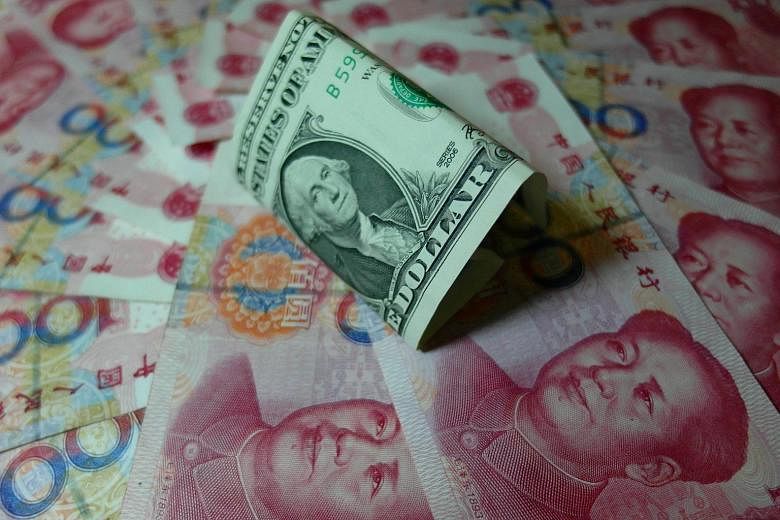1. China yuan, property prices in focus
China's foreign-exchange market is stabilising after a historical week that saw the biggest selloff in two decades and a move to a more market-driven currency regime. Last Tuesday, the People's Bank of China cut its official reference rate, or fixing, by 1.9 per cent, the biggest decline since 1994. The change was an attempt to align the official and market rates, as the central bank moves to a new regime where the central bank gives supply and demand more sways in deciding its foreign exchange rate.
It helped push Asian and commodity-linked currencies lower - especially the ringgit which plunged to all-time low against the Singapore dollar. The Singapore dollar was not spared either, falling to a five-year low below the 1.4 level against the US dollar.
The yuan market exchange rate has converged with the fixing rate since Thursday after consistently trading more than 1 per cent weaker in recent months. That suggests the policy adjustment may be achieving its goal and that there's less likelihood of movements of similar magnitude going forward, according to RBC Capital Markets.
But Chinese growth is slowing, the property market is deflating and the the yuan's surprise devaluation is heightening fears that the actual outlook is worse than markets expect. Chinese housing price data due on Tuesday will probably reinforce views that the market has bottomed out thanks in part to government intervention but prices will continue to show a big year on year drop, indicating a protracted recovery with big implications for commodity prices.
UBS estimates that the property market's downturn will subtract 1.5 percentage points from GDP growth this year and policy measures would have to add another 1.1 per cent on top of the stimulus in 2014 for growth to be close to 7 per cent. The weaker yuan will also add to the emerging market slowdown, with a potential long term impact on advanced economies.
2. Fed minutes may reinforce Sept hike view
The Federal Reserve releases the minutes from its July policy meeting on Wednesday. The minutes are likely to give more details about the timing and path of interest rates. The Fed last month offered subtle hints that it is getting closer to its first increase in nearly a decade, though chair Janet Yellen has emphasized the date is not yet certain. An overwhelming majority of economists polled by The Wall Street Journal expect the Fed to begin raising rates in September, its first hike in nearly a decade, but China's growing economic troubles could yet mess up its plans.
3. Greek bailout deal faces German vote
German lawmakers will decide on the bailout package for Greece on Wednesday. The deal for €86 billion (S$134 billion) in new bailout loans was cleared by eurozone finance ministers on Friday, but still requires approval from some European parliaments. Germany has made the participation of the International Monetary Fund in the bailout a precondition for its own loans, but the IMF has refused to commit until other euro zone governments have taken measures to reduce Greece's debt burden.
4. Dismal Japan data expected
The euro zone's growth slowed to 0.3 per cent in the second quarter, data out last Friday showed, just short of expectations, despite heavy monetary stimulus from the European Central and a weak euro. The weaker yuan is only a moderate headwind for European growth given the currency block's trade deficit with Beijing but adds to deflationary pressures, a headache for the ECB as it spends 60 billion euros a months for asset buys boost prices.
While Europe's GDP mildly disappointed, Japan, the world's third biggest economy, is bracing for an outright dismal reading on Monday with markets expecting a 0.5 per cent contraction in the second quarter on weak exports and consumption. China's slowdown also lowers the chance of a third quarter rebound and will likely rekindle market expectations that the Bank of Japan will expand monetary stimulus, even as central bankers appear wary of acting any time soon.
5. Noble meets investors
Noble Group, the Asia's largest commodity trader that's battling short sellers and criticism of its accounting, is hosting an investor information day in Singapore at 2pm on Monday. According to Singapore-listed group, management will present a comprehensive explanation of how Noble's business works, with a full and open Q&A session for shareholders and members of the public. This will be followed by a press conference.
Last week, Noble released its latest earnings figures as well as a report by PricewaterhouseCoopers on the its accounting practices and treatment of its mark-to-market contracts. After a brief bounce to around 64 cents early in the week, the stock came under pressure, finishing the week at 49 cents for a loss of 9 cents or 15.5 per cent over the four days.
Sources: Reuters, Wall Street Journal, Bloomberg


